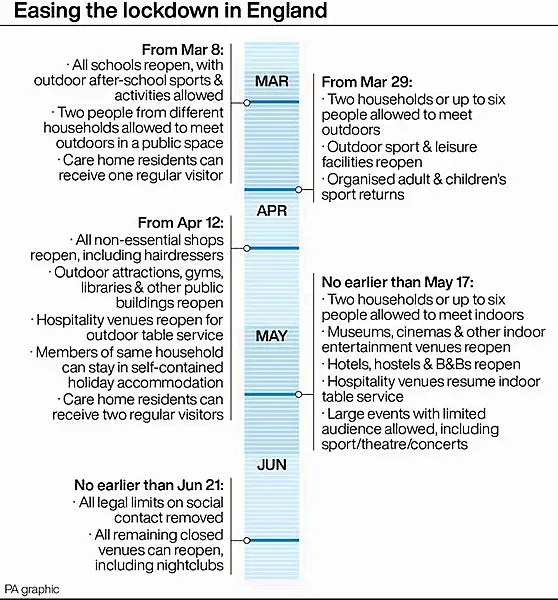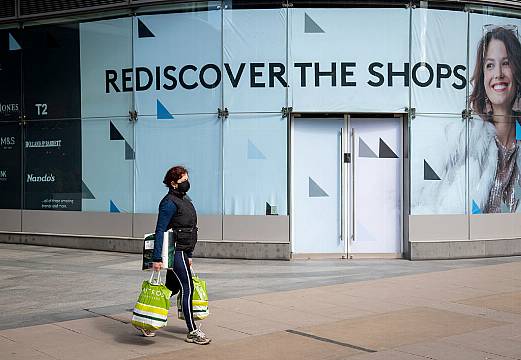Caution has been urged ahead of a major easing of England’s lockdown which will allow pubs and restaurants to serve customers outside, and hairdressers and non-essential shops to resume business.
Indoor gyms, swimming pools, nail salons and zoos will also reopen on Monday.
However, social mixing indoors will remain heavily restricted, with around 40 per cent of adults yet to receive their first dose of a Covid-19 vaccine.

Professor Peter Horby, a senior scientist advising the UK government, warned on Sunday that the remaining rules must be abided by to minimise the effects of a future “rebound” in cases.
Businesses and citizens eagerly anticipated the renewed freedoms, but any fanfare for the easing of restrictions has been somewhat muted by the national mourning for Britain's Prince Philip.
UK prime minister Boris Johnson postponed his celebratory pint and government communications have been pared back to just essential messages after Philip’s death on Friday at the age of 99.
Wales will also enjoy renewed freedoms, with non-essential retail reopening and border restrictions eased to permit travel again with the rest of the UK and Ireland.
Remaining school pupils will return to face-to-face teaching in Wales and Northern Ireland, moves being echoed in Scotland as pupils return from their Easter breaks.
The “stay at home” order in Northern Ireland will also end as the number of people permitted to meet outdoors rises from six to 10.

Prof Horby, chairman of the New and Emerging Respiratory Virus Threats Advisory Group (Nervtag), told Times Radio: “The watchword has got to be caution really.
“The modelling, which is now pretty good, does show that we can expect some kind of rebound – it’s not clear exactly when or how big it will be, but there is, I think, inevitably going to be a bit of a rebound in the number of cases when things are relaxed.”
The University of Oxford academic said the vaccination programme will minimise the extent of hospital admissions and deaths but warned it will not be completely effective.
“Now the extent of it really depends on how well we comply with the ongoing restrictions, so we really have to take this step by step,” he added.
“I think we can be joyful and enjoy the freedoms, but we’ve still got to realise there’s still a large number of people who’ve not been infected or vaccinated, and so they will be at risk.”

Disability charity Scope called for the UK government to give greater support to those most at risk of Covid-19 and protection to prevent them being forced back to workplaces, with shielding advice having ended earlier this month.
Executive director James Taylor said: “Nobody should be forced to choose between their life and their livelihood. Without proper protections in place for those most at risk, that’s exactly what’s going to happen.”
In England, pubs and restaurants have been making changes during lockdown to maximise their ability to serve customers outside.
But the British Beer and Pub Association estimates that just 40 per cent of licensed premises have the space to reopen for outdoor service.
Both the 10pm curfew rule and the requirement to order a substantial meal with a drink have been scrapped, but social distancing must be abided by.
Domestic holidays can resume to an extent, with overnight stays permitted in self-contained accommodation, such as holiday lets and campsites where indoor facilities are not shared.
But these can only be used by members of the same household or support bubble.

International holidays remain banned until an unknown date, amid a row over the cost of testing plans to assist their return.
People will not be allowed to visit each other’s homes, with socialising indoors continuing to be prohibited outside of support bubbles.
It will be the third in a series of easings for England since their third national lockdown was legally imposed on January 6th.
The next significant date is May 17th, when socialising indoors will be permitted under the “rule of six” if Mr Johnson judges that the vaccination programme is driving down the number of infections and deaths.
After three months of full national lockdown, the UK government said on Saturday that a further 40 people had died in the UK within 28 days of a positive Covid-19 test. Another 2,589 lab-confirmed cases were also announced.







